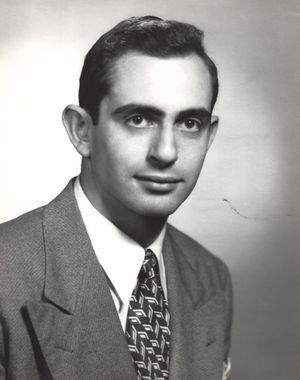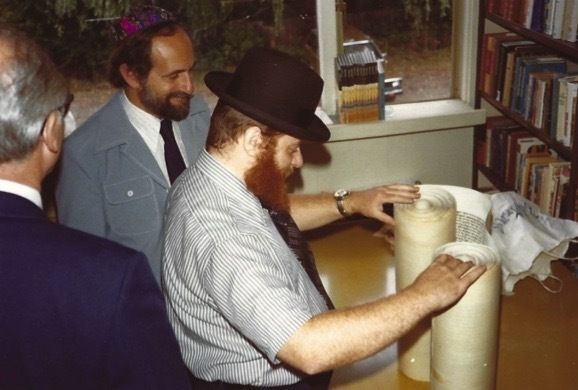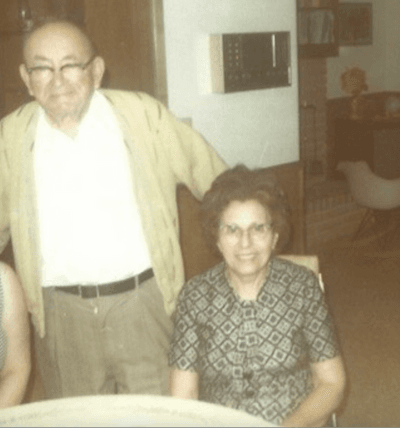In the Seattle Jewish Community

Throughout his life, from his childhood in Detroit to his college days in Los Angeles to his career as a university professor in Maryland and Washington State, the great constant in Ed’s life was his commitment to Jewish values. He met his wife Sylvia through a Jewish social group he helped start in graduate school, was one of the founders of his synagogue in Seattle, worked tirelessly for the freedom of Refuseniks in Soviet Union, and was a leader of the Jewish community at the University of Washington for 50 years.
Ed’s involvement in the Seattle Jewish community began as soon as he and his family moved here in 1965. Upon their arrival, the Sterns became members of Herzl Congregation, a Conservative synagogue. Ed served on the board of directors and was also active on the school board. In 1968, when Herzl decided to move the congregation’s location to Mercer Island, the Sterns and other members of the congregation decided to start a new synagogue that would remain based in Seattle, which ultimately became Congregation Beth Shalom.
Ed was chosen to be the head and first chair of the community’s religious school. Over the years, each of the Sterns’ daughters had their Bat Mitzvahs at Beth Shalom, and each of them moved forward equal rights for girls due to Ed’s advocacy. Hilary had the first bat mitzvah at Beth Shalom on a Saturday morning. Previously girls at Beth Shalom had their bat mitzvahs on Friday nights. Shari was the first female to have an aliyah and read the maftir. Miri was the first female to chant directly from the Torah. Every time he battled for his daughters to be treated the same as boys—and now girls and boys and women and men in the Conservative Movement have exactly the same rights and obligations.
Congregation Beth Shalom was initially located in a rented former school building at the Blessed Sacrament Catholic church in the University District, where both services and school were held. After several years, it was decided that the congregation should own its own home, and they purchased a building from the Unitarian church. Up until this time, Congregation Beth Shalom had been using a borrowed Torah, but that changed when Ed’s mother made a generous donation that allowed the congregation to acquire its own Torah on August 8, 1976.

“My father had passed away the year before,” Ed remembered in his oral history. “He was a yeshiva bocher in his youth. He was greatly influenced by his studies in the Talmud and the Torah, but he himself didn’t pursue that because he felt that the religious aspects of it were not appropriate for modern-day living, and one had to also learn modern-day things. But he would always quote things from the Talmud and the Torah; he was very learned, at least compared to me. So, our family felt this would be a very fitting thing to donate a memorial to my father, and also, the congregation really needed a Sefer Torah, so we were really very pleased when we could give this donation.”

As a professor at the University of Washington as well as an active Hillel board member in the early 1970s, Ed was well acquainted with many of the school’s Jewish students. One point of contention between students active in Hillel and those who weren’t was the latter group’s feeling that Hillel wasn’t aggressive enough in responding to antisemitic propaganda on campus. As a result, they founded what would eventually become the Jewish Information Society, and asked Ed to be their faculty advisor.
“This group started off as the Israel Action Committee. It was a very effective group, and had a lot of very active Jewish students. There was a lot of contention between the Israel Action Committee and the organization of Arab students because of obvious contrasting ideas of what was happening in the Middle East. In 1975, they changed its name to the Jewish Information Society, because they wanted to get away from this sort of propaganda aspect of what was happening, and to give more background information about Jewish culture, Israel culture, and put on a discussion of the right of Israel and the Jewish people to have their own state.”
Even as he advised the Jewish Information Society, Ed continued to be involved with Hillel, and was honored to be the organization’s president from 1982 to 1985. Under Ed’s leadership (and with a donation from Seattle philanthropist Sam Stroum), Hillel hired its first full-time director of student activities. He also led the effort to make UW’s Hillel a statewide organization, helping to organize Jewish groups in other state universities. Ed also helped bridge the differences between the Jewish Information Society and Hillel, a highlight of Ed’s tenure as a leader of the campus’s Jewish community.
Ed was also involved with two other very important Jewish projects on the UW campus: He helped organize his fellow Jewish professors at the UW to found the UW branch of American Professors for Peace in the Middle East and he helped found the UW Jewish Studies Program.
The late Dr. Edward Alexander, the first Chair of the Jewish Studies Committee, remembered Ed's impact on Jewish life at the UW in these written remarks prepared for Ed's funeral in May 2016:
"Ed was among the founding fathers of the UW Jewish Studies Program. He had been a member of the original Hillel Jewish Studies Committee of the late sixties, which also included [Hillel] Rabbi Arthur Jacobovitz, Neal Groman, and Leo Sreebny. When the group received official recognition from Dean George Beckmann in 1971 (and I was conscripted to be its chairman) Ed was the only person outside of the humanities and social sciences faculty to serve on it. He was invaluable not only for his formidable brain and vast knowledge, but also for his unique diplomatic ability to keep the sometimes irascible Rabbi Jacobovitz in check.
Since Ed, like the rest of us involved in the Jewish Studies project, has been consigned to the Orwellian memory hole by a generation that suffers from historical amnesia, I feel it important to recall all this. Without him, I doubt that the University of Washington would now have either a Jewish Studies Program or a contingent--small to be sure--of faculty willing to undertake the defense of Israel against its manifold academic and journalistic slanderers. He certainly exercised a great influence over me, both as a loyal friend and a kind and patient advisor."
